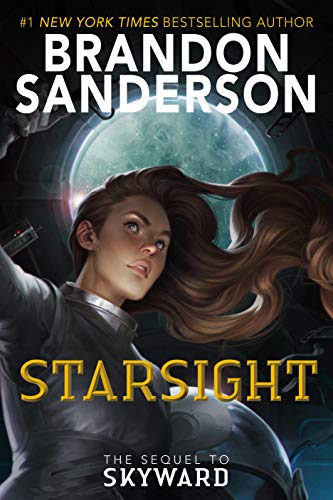
![]() Starsight by Brandon Sanderson
Starsight by Brandon Sanderson
“A hero doesn’t choose her trials.”
Spensa can’t help but hear her Gran-Gran’s voice saying these words to her every time Spensa balks at a new trouble in her life. And Spensa — a magnet for trouble — has plenty of occasions to remember these words.
In Starsight (2019), the sequel to Brandon Sanderson’s young adult science fiction novel Skyward, the few humans who remain have been trapped on the barren planet of Detritus for several decades, with alien guardians who frequently attack the human colony with their fighter spaceships, preventing them from leaving Detritus. Spensa is a hot-headed young fighter pilot who revels in the space battles with the alien Krell, and lately she’s been pushing the envelope in those battles, in the hope that getting herself into deadly danger will trigger her latent cytonic ability, allowing her to hyperjump or teleport herself and her ship through space … and possibly open up a way for the humans to escape Detritus.
 Thanks in part to Spensa’s ability to “hear” the aliens’ remote commands, the humans have been able to push the boundaries of the battle out farther from the planet itself. So when a small single alien spaceship of unknown design appears by their space defense platforms, Spensa is sent to intercept it. She finds the ship is already damaged and its pilot is injured. Before the pilot sinks into a coma, she gives Spensa a warning, combined with a plea to go to a huge deep-space station called Starsight. This may be the opportunity the humans have been looking for to steal the aliens’ hyperdrive technology, but the risks are as immense as the potential rewards.
Thanks in part to Spensa’s ability to “hear” the aliens’ remote commands, the humans have been able to push the boundaries of the battle out farther from the planet itself. So when a small single alien spaceship of unknown design appears by their space defense platforms, Spensa is sent to intercept it. She finds the ship is already damaged and its pilot is injured. Before the pilot sinks into a coma, she gives Spensa a warning, combined with a plea to go to a huge deep-space station called Starsight. This may be the opportunity the humans have been looking for to steal the aliens’ hyperdrive technology, but the risks are as immense as the potential rewards.
I liked Skyward, but I think Starsight is a more unique and engaging novel. Starsight took a sharp turn in a new direction early on, and Sanderson throws in several game-changer developments throughout the novel, keeping both Spensa and the reader on their toes. It wasn’t at all the sequel I expected, and I enjoyed it all the more because of that. Spensa’s horizons and the worldbuilding in this universe both expand exponentially. Starsight is not just a place, it’s also a description of the visions Spensa sees when she’s in the nowhere of hyperspace: stars that are also eyes, focusing their malevolent view on Spensa. Those hate-filled eyes turn out to be significant to both the past and present events.

Brandon Sanderson
Spensa is slowly learning to curb her more reckless impulses and play better with others … well, at least some of the time. If I have a complaint about this novel, it’s that Spensa’s inner thoughts, and the frequent dogmatic declarations she makes to herself about the evils of certain alien individuals and their society, telegraph fairly clearly that Spensa is going to be slapped with a reason to re-examine her internal presumptions and prejudices. Still, I found these perspective changes truly touching when they occurred.
This theme of self-examination and personal identity is reflected in several different characters, particularly M-Bot, Spensa’s AI companion that drives her spaceship. M-Bot is still funny in that annoying way, but he’s also an artificial intelligence having an existential crisis, which adds an interesting flavor to the story. Even the surprisingly delightful Doomslug turns out to be far important than she first appeared.
There are a few interludes in between chapters, featuring some familiar secondary characters, that begin as fairly simple fleshing out of their characters and the world of Detritus, but end in a significant discovery that will almost certainly play a key role in the next book in the SKYWARD series. Between that and the rather cliffhangerish ending of Starsight, I’m searching for a way to teleport myself into the future and get a copy of the next book in this series now rather than in 2021!



Trackbacks/Pingbacks